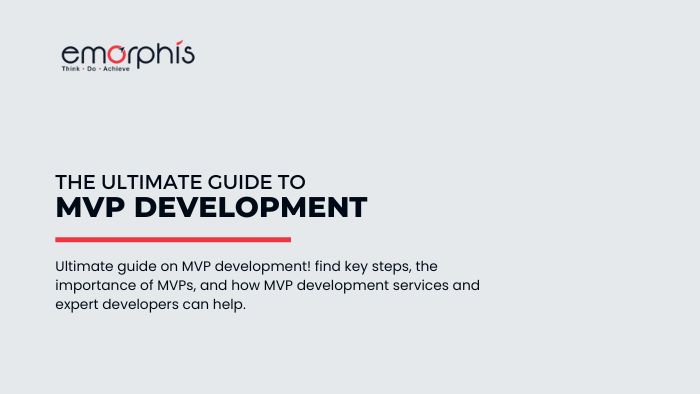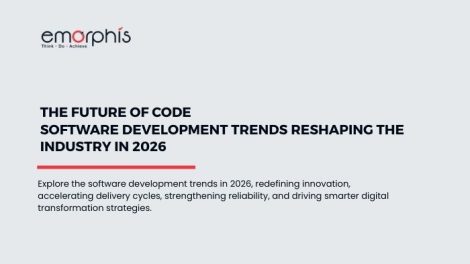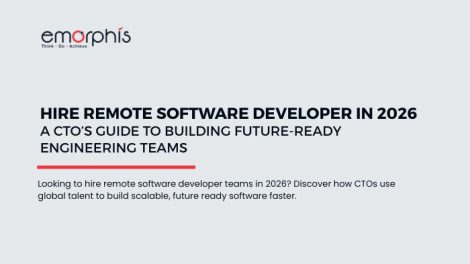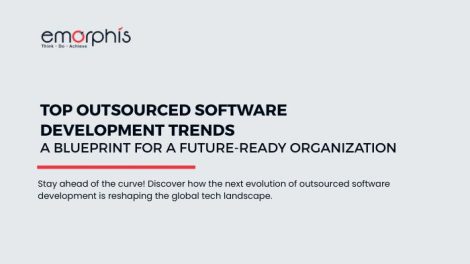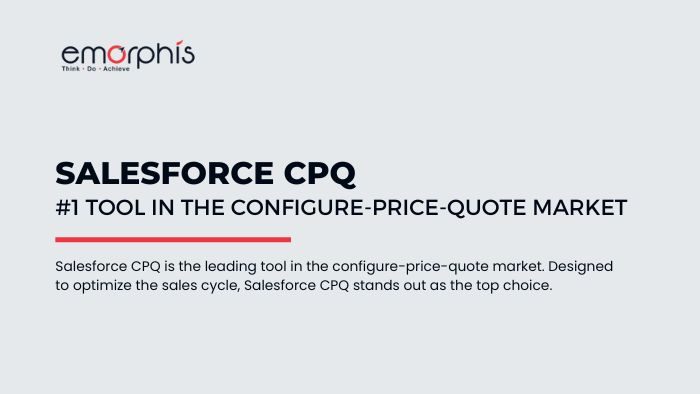In software and application development, the term MVP development holds significant weight. MVP, short for Minimum Viable Product, represents a foundational concept in the iterative process of creating new digital products.
MVP development services cater to a variety of product types. It includes MVP app development, where a basic version of a mobile or web application is to test core functionalities and moreover, gather user feedback.
SaaS MVP development focuses on building scalable, cloud-based software solutions with essential features to, in fact, validate business ideas and attract early adopters.
Other services include e-commerce MVP development, where an online store has fundamental features, and IoT MVP development, which involves creating connecting devices with basic capabilities to test market demand.
Each type of MVP development is tailored to meet specific industry needs and user expectations. Moreover, the major reason to do so is to secure funding for the end product. Hence, let us check it in more detail.
What will you Learn?
This guide aims to delve deep into what MVP development entails. This includes its market overview, its importance, and the steps involved. Moreover, the crucial role played by MVP development services and MVP developers. Also, it includes the cost of development before concluding.
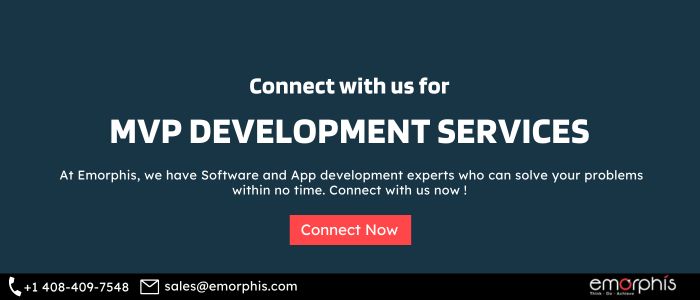
Market Overview
As of the latest available data in 2023, the market for MVP development services and related sectors continues to evolve rapidly. Here are some key insights and statistics.
The global software development market size was valued at approximately USD 448.16 billion in 2021 and is expected to grow at a compound annual growth rate (CAGR) of around 19.5% from 2022 to 2031. This growth is driven by increasing digital transformation initiatives across various industries, including healthcare, finance, retail, and manufacturing.
Importance of MVP Development
With the rise of digital startups and the shift towards agile development methodologies, the importance of MVP development has grown significantly. Startups and enterprises increasingly adopt MVP strategies to minimize risks, accelerate time-to-market, and validate market demand before scaling their products.
Technology Adoption
Cloud computing, artificial intelligence (AI), the Internet of Things (IoT), and blockchain are among the key technologies driving innovation in MVP development. These technologies enable developers to create scalable, secure, and intelligent MVPs that meet the evolving demands of users and businesses.
Regional Insights
North America and Europe continue to dominate the software development market, owing to advanced technological infrastructure, robust R&D activities, and high adoption rates of digital solutions. However, Asia-Pacific is witnessing rapid growth, fueled by increasing investments in IT infrastructure and rising digitalization across sectors.
Market Dynamics
The MVP development services market is characterized by intense competition among service providers, moreover, ranging from specialized MVP development firms to full-service digital agencies. Key players often differentiate themselves through domain expertise, also technological innovation, and client-centric service offerings.
Emerging Trends
Trends such as low-code/no-code development platforms, DevOps practices, and cross-platform compatibility are reshaping the landscape of MVP development. These trends empower developers to streamline development processes, also enhance collaboration, and deliver scalable MVPs with reduced time and costs.
Future Outlook
Looking ahead, the MVP development market is expected to witness continued growth driven by increasing digital disruption. Also, rapid technological advancements, and evolving consumer preferences. Moreover, organizations that embrace agile development practices and prioritize MVP strategies are likely to gain a competitive edge in their respective markets.
Overall, the MVP development landscape is dynamic and evolving, driven by technological innovation, changing consumer behaviors, and increasing digitalization across industries. Understanding these market dynamics and leveraging the latest technologies and methodologies are crucial for businesses that are moreover, aiming to succeed in today’s competitive environment.

Understanding MVP Development
MVP development refers to the strategy of releasing a basic version of a product with minimum features that still solve a core problem for its users. In fact, the primary goal is to gather feedback early from initial users, which helps in validating assumptions, testing hypotheses, and shaping the future development roadmap. This approach not only reduces the time to market but also minimizes resource expenditure on features that might not resonate with the target audience.
Importance of MVP Development
The importance of MVP development cannot be overstated in the context of product innovation and market validation. By focusing on essential features, MVPs allow businesses to:
- Validate Ideas: MVPs help in testing the feasibility and market demand for a product idea before investing heavily in its development.
- Reduce Risks: By gathering early user feedback, businesses can identify potential issues and make necessary adjustments early in the development cycle, thereby reducing risks associated with full-scale product launches.
- Save Costs: Developing a minimal version of the product saves costs compared to building a fully-featured product from the outset.
- Iterative Improvement: MVPs provide a foundation for iterative development, where subsequent versions can incorporate additional features based on user feedback and market demand.
Steps in MVP Development
1. Identifying the Core Problem
The first step in MVP development is to clearly define the core problem or pain point that the product aims to solve. This involves conducting market research, understanding user needs, and identifying a niche or gap in the market.
2. Defining MVP Features
Once the problem is identified, the next step is to determine the essential features that address this problem. These features should be minimal yet sufficient to deliver value to early adopters.
3. Building the MVP
MVP development services come into play during this stage. Experienced MVP developers collaborate with product owners to build the initial version of the product. This involves rapid prototyping, iterative development cycles, and continuous integration of user feedback.
4. Testing and Gathering Feedback
After building the MVP, it is crucial to release it to a small group of users or beta testers. This phase involves collecting qualitative and quantitative feedback regarding usability, functionality, and overall user experience.
5. Iterating and Scaling
Based on the feedback received, the MVP undergoes iterations to improve features, fix bugs, and enhance usability. The goal is to refine the product iteratively until it achieves product-market fit. Once validated, the product can be scaled to reach a broader audience.
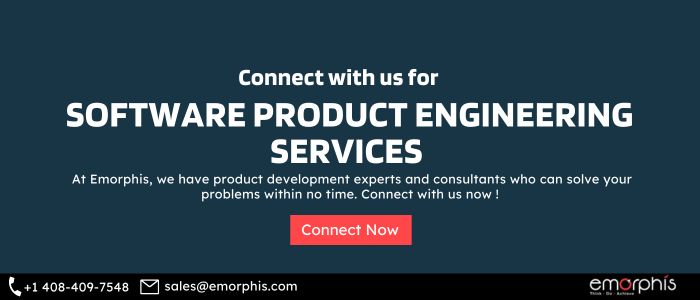
Role of MVP Development Services
MVP development services encompass a range of activities and expertise essential for successfully bringing an MVP to life. These services typically include:
- Product Strategy: Collaborating with clients to define product goals, target audience, and market positioning.
- UI/UX Design: Creating intuitive and user-friendly interfaces that enhance the overall user experience.
- Prototyping: Develop functional prototypes that demonstrate the core features and functionalities of the MVP.
- Development: Building the MVP using agile methodologies to ensure flexibility and responsiveness to changing requirements.
- Testing and Quality Assurance: Conduct rigorous testing to identify and resolve issues.
- Deployment and Support: Assisting with deployment on appropriate platforms and providing ongoing support and maintenance post-launch.
Engaging MVP development services ensures that businesses benefit from specialized knowledge, streamlined processes, and accelerated development cycles, ultimately leading to faster time-to-market and competitive advantage.
Characteristics of Successful MVP Developers
MVP developers play a pivotal role in MVP development projects. They possess a unique set of skills and attributes that contribute to the success of the product. Key characteristics of MVP developers include:
- Technical Proficiency: Strong skills in programming languages, frameworks, and development tools relevant to the project.
- Agile Mindset: Ability to work in iterative cycles, adapt to changes, and prioritize tasks based on evolving requirements and feedback.
- Problem-Solving Skills: Capacity to identify challenges, propose solutions, and implement effective strategies to overcome obstacles.
- Collaboration: Aptitude for working closely with cross-functional teams including designers, product managers, and quality assurance professionals.
- User-Centric Approach: Focus on understanding user needs and preferences to create products that resonate with the target audience.
By embodying these qualities, MVP developers contribute significantly to the development and success of MVPs, ensuring that they meet user expectations and business objectives.
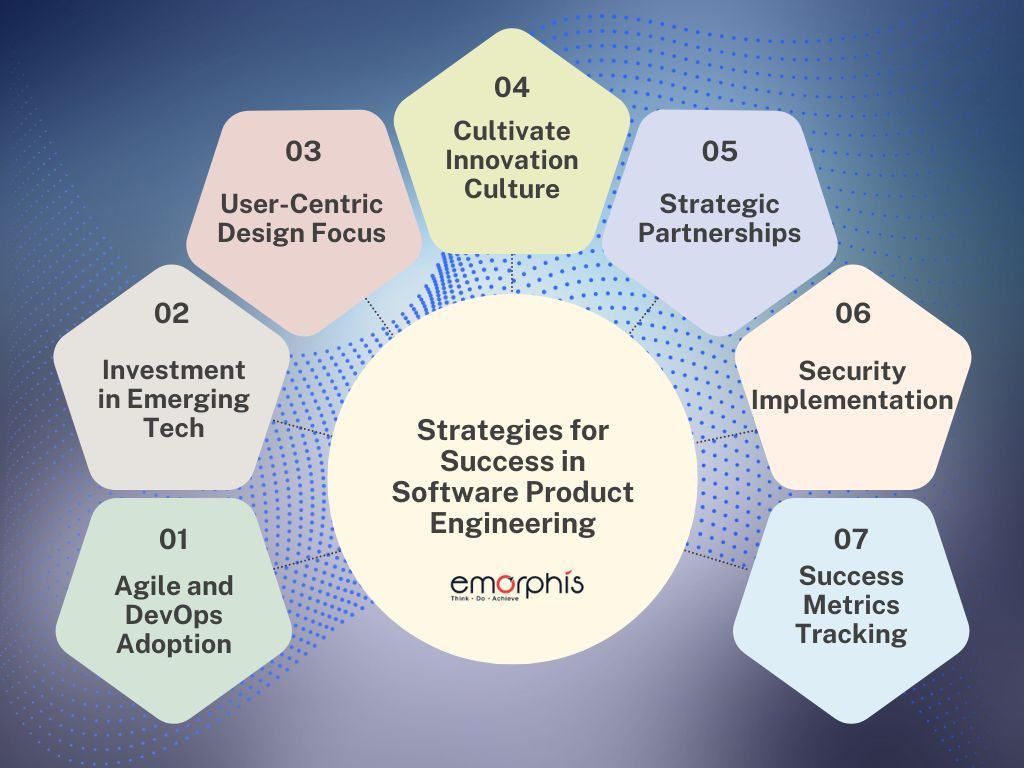
Challenges in MVP Development
While MVP development offers numerous advantages, it is not without its challenges. Some common challenges include:
- Feature Prioritization: Deciding which features are essential for the MVP while balancing stakeholder expectations and technical feasibility.
- User Feedback Interpretation: Effectively interpreting and incorporating diverse user feedback to drive meaningful improvements.
- Resource Constraints: Managing limited resources such as time, budget, and manpower throughout the development process.
- Market Competition: Navigating competitive landscapes and differentiating the MVP from existing solutions in the market.
Addressing these challenges requires a proactive approach, strategic decision-making, and effective communication among team members and stakeholders.
Cost of MVP Development
The cost of MVP development can vary significantly based on several factors, including the complexity of the project, the features required, the technology stack, the location of the development team, and the engagement model (in-house, freelance, or agency). Here’s a detailed breakdown of the factors affecting the cost and typical price ranges for MVP development.
Key Factors Affecting the Cost of MVP Development
The cost of MVP development is influenced by several key factors, each playing a critical role in determining the overall budget. Project complexity and scope are primary determinants, with simple MVPs featuring basic functionalities and complex MVPs incorporating advanced features like AI integration and real-time data processing, each escalating costs accordingly.
The choice of the development team significantly impacts expenses, with freelancers often being more cost-effective, in-house teams offering better control at higher costs, and agencies providing comprehensive services at premium rates. Geographical location also affects costs, as developers in North America and Western Europe command higher fees compared to those in Eastern Europe, Latin America, or Asia.
Additionally, the technology stack chosen for development, whether it involves open-source or proprietary solutions, influences costs, as does the design and user experience, with custom designs being more expensive than template-based ones. Finally, ongoing maintenance and support post-launch are essential considerations, as they incur additional costs to ensure the MVP’s sustained functionality and success.

Typical Cost Ranges for MVP Development
Based on the above factors, here are the typical cost ranges for MVP development:
- Simple MVP:
- Cost Range: $10,000 to $50,000
- Examples: Basic mobile app with limited features, simple web applications.
- Medium Complexity MVP:
- Cost Range: $50,000 to $100,000
- Examples: E-commerce platforms, social networking apps with user profiles and messaging features.
- Complex MVP:
- Cost Range: $100,000 to $250,000+
- Examples: Enterprise-level applications, apps with advanced AI features, and real-time data processing systems.
Do not miss to read – The Ultimate Guide To Wearable App Development
Conclusion
In conclusion, MVP development is a strategic approach to product development that emphasizes delivering value to users with minimal features. It serves as a launchpad for validating ideas, gathering feedback, and refining products based on real-world usage. MVP development services and MVP developers play crucial roles in this process by providing expertise, technical proficiency, and collaborative support.
By embracing MVP development principles and leveraging professional services, businesses can enhance their innovation capabilities, mitigate risks, and achieve sustainable growth in today’s competitive market landscape.
Whether you’re a startup looking to test a new product idea or an established enterprise aiming to innovate, understanding and implementing MVP development principles can pave the way for successful product launches and long-term business success.
Ready to bring your software idea to life and optimize your development strategy? Partner with us for comprehensive software product development and software consulting services. Our expert team will transform your vision into a high-quality, user-centric product while guiding you through every step of the process. From initial strategy to implementation, we deliver innovative solutions tailored to your needs.
Contact us today to start your journey from concept to launch with confidence and efficiency. Let’s build and grow something amazing together!



